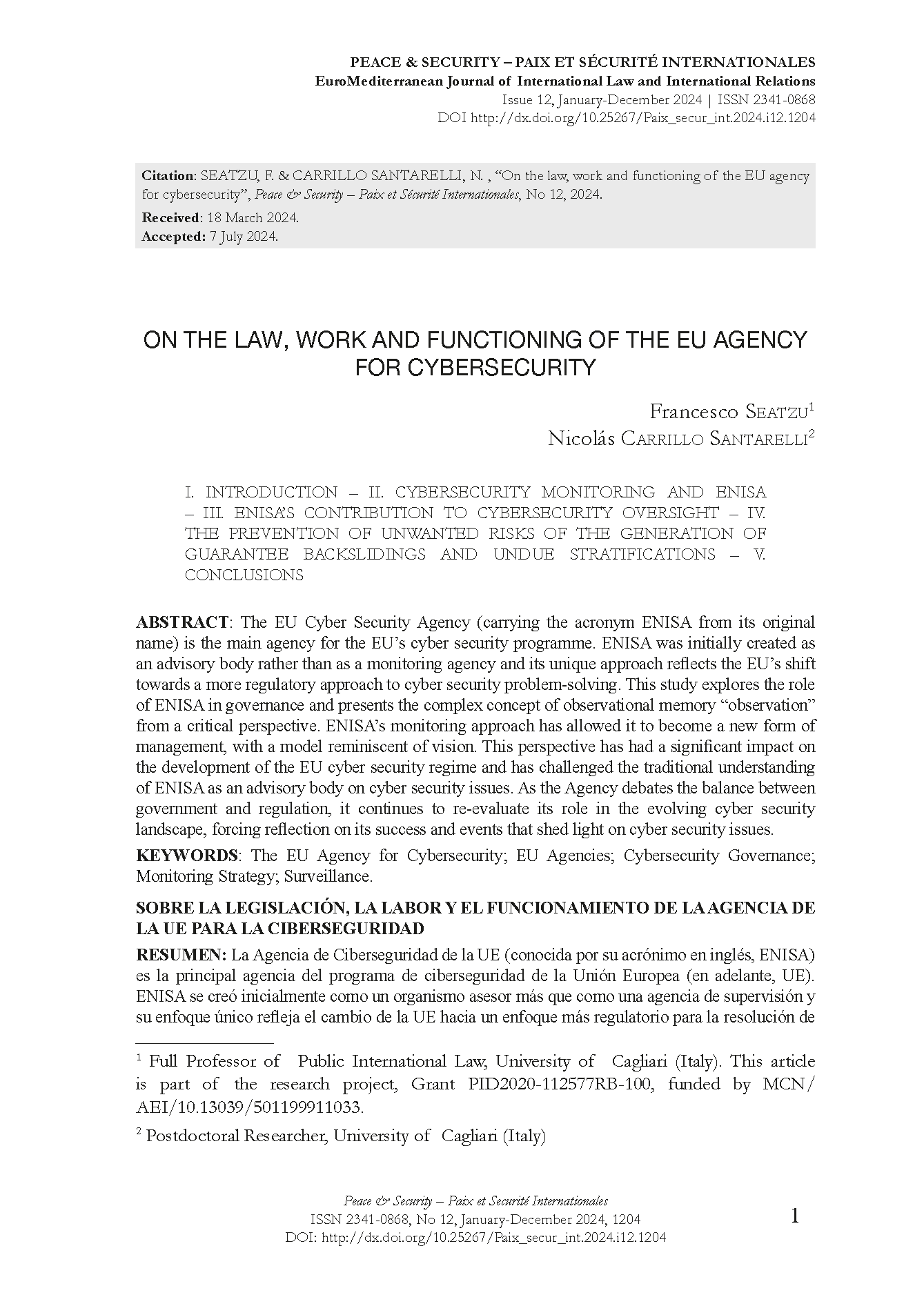On the law, work and functioning of the EU agency for cybersecurity

DOI
https://doi.org/10.25267/Paix_secur_int.2024.i12.1204Información
Resumen
The EU Cyber security Agency (carrying the acronym ENISA from its original name) is the main agency for the EU's cyber security programme. ENISA was initially created as an advisory body rather than as a traditional monitoring agency and its unique approach reflects the EU's shift towards a more regulatory approach to cyber security problem-solving. This study explores the role of ENISA in governance and presents the complex concept of observational memory “observation” from a critical Foucauldian perspective. ENISA's monitoring approach has allowed it to become a new form of management, with a model reminiscent of vision. This perspective has had a significant impact on the development of the EU cyber security regime and has challenged the traditional understanding of ENISA as an advisory body on cyber security issues. As the agency debates the balance between government and regulation, it continues to re-evaluate its role in the evolving cyber security landscape, forcing reflection on its success and events that shed light on cyber security issues.
Palabras clave
Descargas
Cómo citar
Licencia
Derechos de autor 2024 PEACE & SECURITY-PAIX ET SÉCURITÉ INTERNATIONALES (EuroMediterranean Journal of International Law and International Relations)

Esta obra está bajo una licencia internacional Creative Commons Atribución-NoComercial 4.0.
Copyright
Es condición para la publicación que el autor o autores ceda(n) a la Revista, en exclusiva, los derechos de reproducción. Paix et Sécurité Internationales es una revista que proporciona un acceso abierto inmediato a su contenido totalmente gratuito para lectores como para los investigadores que pretendan publicar en ella, ya que no se realizan cobros por concepto de envío, procesamiento ni publicación. Los usuarios podrán leer, descargar, copiar, distribuir, imprimir, buscar o enlazar el texto completo de los artículos publicados, o utilizarlos para cualquier otro propósito, dentro de la legalidad vigente. Y podrán hacerlo sin coste alguno, y sin necesitad de solicitar permiso al editor a al autor. Todo ello de acuerdo con la definición de acceso abierto de la Iniciativa Acceso Abierto de Budapest.
Citas
ALFREDSSON, G., GRIMHEDEN, J., RAMCHARAN, B. and ZAYAS, A. (eds.), International human rights monitoring mechanisms: essays in honour of Jakob Th. Möller, Brill, Amsterdam, Boston, 2009.
ARMSTRONG, K.A., “Rediscovering civil society: the European Union and the White Paper on Governance”, European Law Journal, Vol. 8, No. 1, 2012, pp. 102-132.
BACKMAN, S., “Risk vs. threat-based cybersecurity: the case of the EU”, European Security, Vol. 32, No. 1, 2023, p. 85 ff.
BENDIEK, A., BOSSONG, R. and SCHULTZE, M., The EU’s revised cybersecurity strategy: half-hearted progress on far-reaching challenges, Deutsches Institut für Internationale Politik und Sicherheit, Berlin, 2017.
BRANDÃO, A. and CAMISÃO, P., “Playing the Market Card: The Commission’s Strategy to Shape EU Cybersecurity Policy”, JCMS: Journal of Common Market, Vol. 60, No. 5, 2022, pp. 1335-1355.
BRUN, L., “The role of the European Union Agency for Network and Information Security (ENISA) in the governance strategies of European cybersecurity”, Master’s thesis, Université catholique de Louvain and Université Saint-Louis, 2018.
CHAMON, M., EU Agencies: Legal and Political Limits to the Transformation of the EU Administration, Oxford, 2016.
CHAMON, M., “EU Agencies: Does the Meroni Doctrine Make Sense?”, Maastrich Journal of European and Comparative Law, Vol. 17, No. 3, 2010, p. 281 ff.
GÖRISCH, C., “Die Agenturen der Europäischen Union”, JURA-Juristische Ausbildung, Vol. 38, No. 4, 2012, p. 10 ff.
HOUT, W. (ed.), EU Strategies on Governance Reform: Between Development and State-building, Sweet and Maxwell, London, 2012.
KINGSBURY, B., KRISCH, N. and STEWART, R.B., “The Emergence of Global Administrative Law”, Law and Contemporary Problems, Vol. 68, No. 3/4, 2005, pp. 24-25.
KOPCHEV, V., “The European Union Moves Ahead on Cybersecurity Research Through Enhanced Cooperation and Coordination”, Information & Security: An International Journal, Vol. 43, No. 3, 2019, pp. 67-81.
MITRAKAS, A., “The emerging EU framework on cybersecurity certification”, Datenschutz und Datensicherheit – DuD, Vol. 42, No. 2, 2018, p. 411 ff.
SEGURA, A., El desafiío de la ciberseguridad global, Tirant lo Blanch, Valencia, 2023.
TOVO, C., Le agenzie decentrate dell’Unione europea, Naples, 2016.
VOS, E., “Reforming the European Commission: What role to play for EU agencies?”, Common Market Law Review, Vol. 37, No. 5, 2000, pp. 1113-1134.






